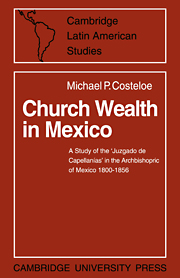 Church Wealth in Mexico
Church Wealth in Mexico Book contents
- Frontmatter
- Contents
- Acknowledgements
- Preface
- Abbreviations
- Introduction
- 1 The Juzgado de Capellanías. Organization and employees
- 2 The Juzgado and its revenue
- 3 Personal loans from the Juzgado
- 4 The effects of clerical investment
- 5 The Juzgado and the State
- Conclusion
- List of sources and works cited
- Index
- Frontmatter
- Contents
- Acknowledgements
- Preface
- Abbreviations
- Introduction
- 1 The Juzgado de Capellanías. Organization and employees
- 2 The Juzgado and its revenue
- 3 Personal loans from the Juzgado
- 4 The effects of clerical investment
- 5 The Juzgado and the State
- Conclusion
- List of sources and works cited
- Index
Summary
The myriad activities and interests of the Juzgado clearly indicate its importance and influence within the economic and social structure of Mexico. As the sole banking institution in the country, the fiscal policy and lending operations undertaken by the various Judges and officials provided a unique source of finance for any aspiring merchant or impecunious landowner. To the latter, the Church must indeed have seemed benevolent, for the low interest charges and easy terms imposed by the clergy contrasted sharply with the exorbitant demands of the capitalist money-lenders, the notorious agiotistas. The Juzgado was not in the modern sense a profit-making enterprise. It owed its existence partly to the desire of the wealthy, for religious or other reasons, to bequeath money for the benefit of the Church or their descendants, and partly to the constant need of the property-owning classes to borrow money. Having achieved a substantial revenue the success of its operations was not determined by any preconceived policy or by the great spiritual influence of the Church, but by the public demand for financial assistance.
It was for this reason that the Juzgado, and to a lesser extent the regular orders, were allowed by the Spanish monarchy to achieve such extensive control of real estate by means of mortgages. The Crown had in effect no means of preventing this, for the public demand had to be met.
- Type
- Chapter
- Information
- Church Wealth in MexicoA Study of the 'Juzgado de Capellanias' in the Archbishopric of Mexico 1800–1856, pp. 127 - 132Publisher: Cambridge University PressPrint publication year: 1967


